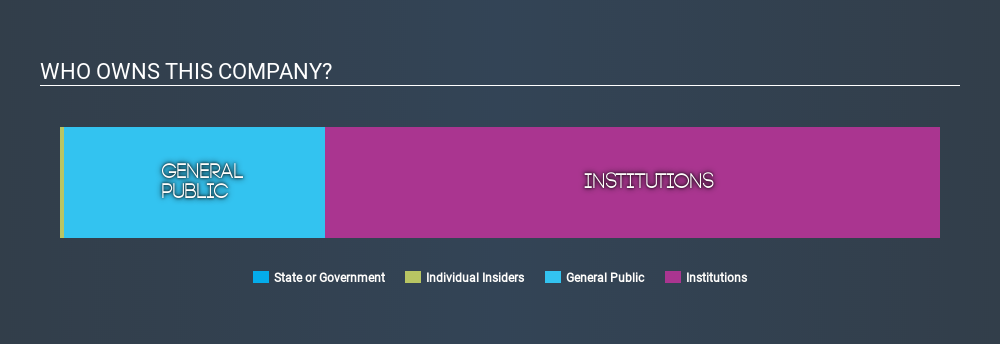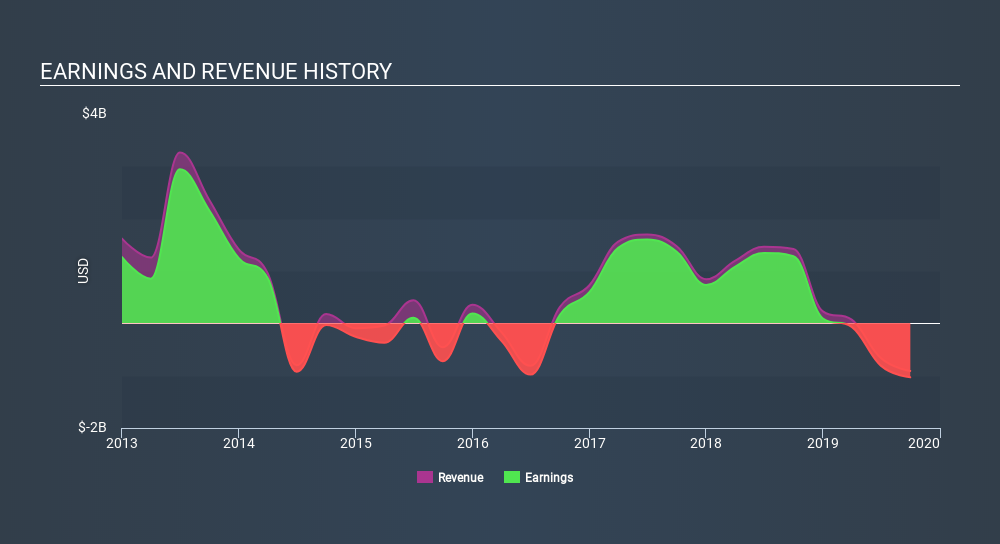- United States
- /
- Mortgage REITs
- /
- NasdaqGS:AGNC
What Type Of Shareholder Owns AGNC Investment Corp.'s (NASDAQ:AGNC)?

The big shareholder groups in AGNC Investment Corp. (NASDAQ:AGNC) have power over the company. Institutions will often hold stock in bigger companies, and we expect to see insiders owning a noticeable percentage of the smaller ones. We also tend to see lower insider ownership in companies that were previously publicly owned.
AGNC Investment has a market capitalization of US$9.8b, so it's too big to fly under the radar. We'd expect to see both institutions and retail investors owning a portion of the company. Taking a look at our data on the ownership groups (below), it's seems that institutions own shares in the company. Let's delve deeper into each type of owner, to discover more about AGNC Investment.
View 3 warning signs we detected for AGNC Investment

What Does The Institutional Ownership Tell Us About AGNC Investment?
Institutions typically measure themselves against a benchmark when reporting to their own investors, so they often become more enthusiastic about a stock once it's included in a major index. We would expect most companies to have some institutions on the register, especially if they are growing.
We can see that AGNC Investment does have institutional investors; and they hold 70% of the stock. This suggests some credibility amongst professional investors. But we can't rely on that fact alone, since institutions make bad investments sometimes, just like everyone does. When multiple institutions own a stock, there's always a risk that they are in a 'crowded trade'. When such a trade goes wrong, multiple parties may compete to sell stock fast. This risk is higher in a company without a history of growth. You can see AGNC Investment's historic earnings and revenue, below, but keep in mind there's always more to the story.

Since institutional investors own more than half the issued stock, the board will likely have to pay attention to their preferences. AGNC Investment is not owned by hedge funds. Our data shows that BlackRock, Inc. is the largest shareholder with 11% of shares outstanding. With 10% and 4.3% of the shares outstanding respectively, The Vanguard Group, Inc. and Michigan Department of Treasury, Bureau of Investments are the second and third largest shareholders.
Our studies suggest that the top 14 shareholders collectively control less than 50% of the company's shares, meaning that the company's shares are widely disseminated and there is no dominant shareholder.
While studying institutional ownership for a company can add value to your research, It is also a good practice to research analyst recommendations to get a deeper understand of a stock's expected performance. There are plenty of analysts covering the stock, so it might be worth seeing what they are forecasting, too.
Insider Ownership Of AGNC Investment
The definition of company insiders can be subjective, and does vary between jurisdictions. Our data reflects individual insiders, capturing board members at the very least. The company management answer to the board; and the latter should represent the interests of shareholders. Notably, sometimes top-level managers are on the board, themselves.
I generally consider insider ownership to be a good thing. However, on some occasions it makes it more difficult for other shareholders to hold the board accountable for decisions.
Our most recent data indicates that insiders own less than 1% of AGNC Investment Corp.. It is a very large company, so it would be surprising to see insiders own a large proportion of the company. Though their holding amount to less than 1%, we can see that board members collectively own US$47m worth of shares (at current prices). There's no doubt that we learn useful information from looking at a company's ownership structure and shareholders. But ultimately, many risks exist within the business itself, rather than its shareholders. For example, we've discovered 3 warning signs for AGNC Investment (of which 1 is major) which any shareholder or potential investor should be aware of.
General Public Ownership
The general public, with a 30% stake in the company, will not easily be ignored. While this size of ownership may not be enough to sway a policy decision in their favour, they can still make a collective impact on company policies.
Next Steps:
While it is well worth considering the different groups that own a company, there are other factors that are even more important.
I like to dive deeper into how a company has performed in the past. You can find historic revenue and earnings in this detailed graph.
But ultimately it is the future, not the past, that will determine how well the owners of this business will do. Therefore we think it advisable to take a look at this free report showing whether analysts are predicting a brighter future.
NB: Figures in this article are calculated using data from the last twelve months, which refer to the 12-month period ending on the last date of the month the financial statement is dated. This may not be consistent with full year annual report figures.
If you spot an error that warrants correction, please contact the editor at editorial-team@simplywallst.com. This article by Simply Wall St is general in nature. It does not constitute a recommendation to buy or sell any stock, and does not take account of your objectives, or your financial situation. Simply Wall St has no position in the stocks mentioned.
We aim to bring you long-term focused research analysis driven by fundamental data. Note that our analysis may not factor in the latest price-sensitive company announcements or qualitative material. Thank you for reading.
About NasdaqGS:AGNC
AGNC Investment
Provides private capital to housing market in the United States.
High growth potential slight.
Similar Companies
Market Insights
Community Narratives





